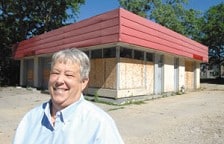Campus Cleaners to green up with relocation
Dixie Byers' long-time connection to Drake University keeps her business booming

A dry cleaner with long-standing ties to Drake University will relocate this fall as the school plans to convert the site of its current location into green space.
Dixie Byers, the owner of Campus Cleaners, has green plans of her own.
She is preparing for a major overhaul of the business, which has been located across the street from Drake at 2800 University Ave. for nearly 40 years.
Byers, who acquired the company in 1999, said she had been considering an upgrade for nearly 18 months before the university informed her that it would not renew her lease on the aging building it owns.
That news kicked the process into high gear.
“I’m going to state-of-the-art equipment,” Byers said, referring to her pending move to 3401 University Ave., the former site of a gas station and about six blocks west of Drake’s campus.
Mark Graziano, a Drake graduate who owns Bauder Pharmacy on Ingersoll Avenue, purchased that property on Feb. 5 for $70,000, according to the Polk County assessor’s website.
On May 24, the Des Moines City Council unanimously approved a resolution to rezone the parcel to commercial from residential, which will allow for the adaptive reuse of the building.
Operating as M Investments LLC, Graziano said his motivation for the development is twofold.
“I bought the corner to clean it up,” he said. “It allows Campus Cleaners to grow and expand, and it takes care of the neighborhood. We’re going to put a business there that’s a mainstay in the area.”
“He has a great interest in the Drake neighborhood,” Byers said, adding that Graziano is covering the cost of the build-out. “He walked through my door and said, ‘Don’t worry about it; we’ll get a building.'”
She said Drake has also been supportive, and the school will hold off on plans to demolish two buildings on the parcel until Campus Cleaners is situated in its new space. It even gave her some free rent.
Byers plans to spend no more than $125,000 to install new machinery and a point-of-sale system that will monitor transactions and track inventories. The advancements will allow Campus Cleaners to communicate quickly with customers when a service is completed.
“I can send a text message that says your clothes are done,” said Byers, 60, noting that the Drake students she loves and supports are barreling into the 21st century. “I’m going with them,” she added. “They keep me young.”
Her new shop will also feature a coffee bar.
A new dry-cleaning apparatus will represent Byers’ move away from the use of tetrachloroethylene – also known as perchloroethylene or perc – a solvent-based dry-cleaning solution that the U.S. Environmental Protection Agency (EPA) said has been linked to both human health and environmental concerns.
“We are going to switch to a process that is called hydrocarbon,” said Todd Byers, the owner’s brother. Todd works at the shop and plans to take over the business when his sister retires. “It’s a lot more environmentally friendly,” he said. “So our carbon footprint is going to be substantially less.”
Byers, a two-time survivor of ovarian cancer, said studies linking perc to cancer have helped solidify her decision to invest in a new hydrocarbon machine.
Since 1992, the EPA has worked with the dry-cleaning industry to reduce exposures to perc, which at certain levels of concentration and exposure is a “potential carcinogen,” said Chris Whitley of the EPA’s Office of Pubic Affairs.
But is the hydrocarbon method safer than the perc method?
“The short answer to that is yes,” Whitley said, “largely because of the hazards that are associated with perc itself. Bear in mind that the hydrocarbon method does still use solvents,” he said. “So it’s not 100 percent green. But it’s definitely greener than the perc method.”
According to the EPA, approximately 28,000, or 85 percent, of U.S. dry cleaners use perc as their primary solvent.
Todd said another alternative Campus Cleaners has explored is offered by Kansas City, Mo.-based GreenEarth Cleaning LLC. According to that company’s website, GreenEarth machines provide “an environmentally safe dry-cleaning process that replaces petroleum-based solvents with liquid silicone.”
Todd said GreenEarth machines cost about $75,000, compared with an approximately $30,000 price tag for new perc units. Campus Cleaners plans to spend around $45,000 on its new machine.
Todd and Dixie Byers said Campus Cleaners is in line with EPA regulations regarding the use of perc. And Byers did not suggest that her use of the product has had any direct impact on her cancer diagnosis.
But being among the 7 percent of women to survive ovarian cancer twice, she said, was enough to justify the switch.
“When you hear carcinogens, you think of cancer,” she said. “Why wouldn’t I do it? It is kind of a way of giving back.”
Todd said though hydrocarbon machines are more expensive than perc machines, they cost slightly less to operate.
Campus Cleaners hopes to stay in front of states such as Illinois, where proposed legislation, if approved, would ban dry cleaners in that state from installing new perc machines beginning Jan. 1, 2011, and completely outlaw their use in 2026.
In 2007, California became the first state to ban perc when the California Air Resources Board adopted regulatory amendments to completely phase out the chemical’s use by 2023.
“We won’t be the first ones to switch away from perchloroethylene,” Todd said. “We just don’t want to sacrifice the quality of our product, because that’s what is important to us. But we feel we can still be a friend to the environment.”
“My goal is to get the equipment paid for over the next five years,” Byers said, noting that she doesn’t intend to raise prices.
Besides, the new equipment will allow Campus Cleaners to increase production without having to hire more employees, even though it will begin cleaning in-house about 45,000 shirts a year, rather than outsourcing that garmet type to another laundry as it does now.
“My focus has changed a little bit from trying to become a higher-volume store to being to a certain degree more state of the art and more productive,” Todd said.
One thing that won’t change with the new arrangement is Byers’ relationship with Drake, which she credits for a great deal of her success during the past decade.
Byers, a staunch supporter of Bulldog athletics, said her connection to the campus has helped her business grow well outside of the Drake neighborhood, noting that some of her largest clients are Principal Financial Group Inc., Casey’s General Stores Inc. and Iles Funeral Homes.
For the first time this year, Campus Cleaners was the official dry cleaner of the Principal Charity Classic golf tournament in West Des Moines.
Her winning streak continues.
“I don’t know anybody in our department that doesn’t use Campus Cleaners,” said Sandy Hatfield Clubb, Drake’s athletic director. “Dixie is just the epitome of a connector. She has a personality that just brings people in.”
Clubb said Byers, who was recently appointed to the board of directors for the Drake Athletics Bulldog Club and serves on its membership and fund-raising committees, would never let anyone bad-mouth the athletic department.
“She has been an unbelievable asset for Drake and Drake athletics,” Clubb said.
“The dividends started coming back my way,” Byers said. “Believe it or not, a lot of young people do dry-clean clothes,” such as Drake law, pharmacy and business students.
Before getting into the dry-cleaning business, Byers was a vice president of operations for Matco Manufacturing in Johnston for seven years. Todd spent the past 13 years as a caddy on the PGA Champions Tour before returning to Des Moines last September. Both grew up in Lake Park, west of Lake Okoboji.
Byers said after she retires, her relationship with Drake will continue indefinitely and that her brother understands the power of close ties to a university.
“I never spent a dime on a piece of paper for marketing, I never spent a dime on advertising, I never spent a dime on the radio, I never spent a dime on the TV,” Byers said.
“I’ve always said that reaching out to Drake is how I made it in business.”









